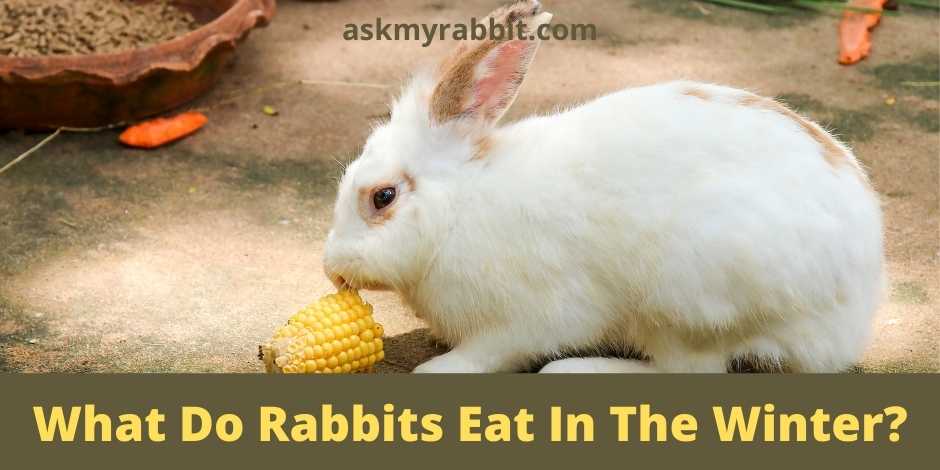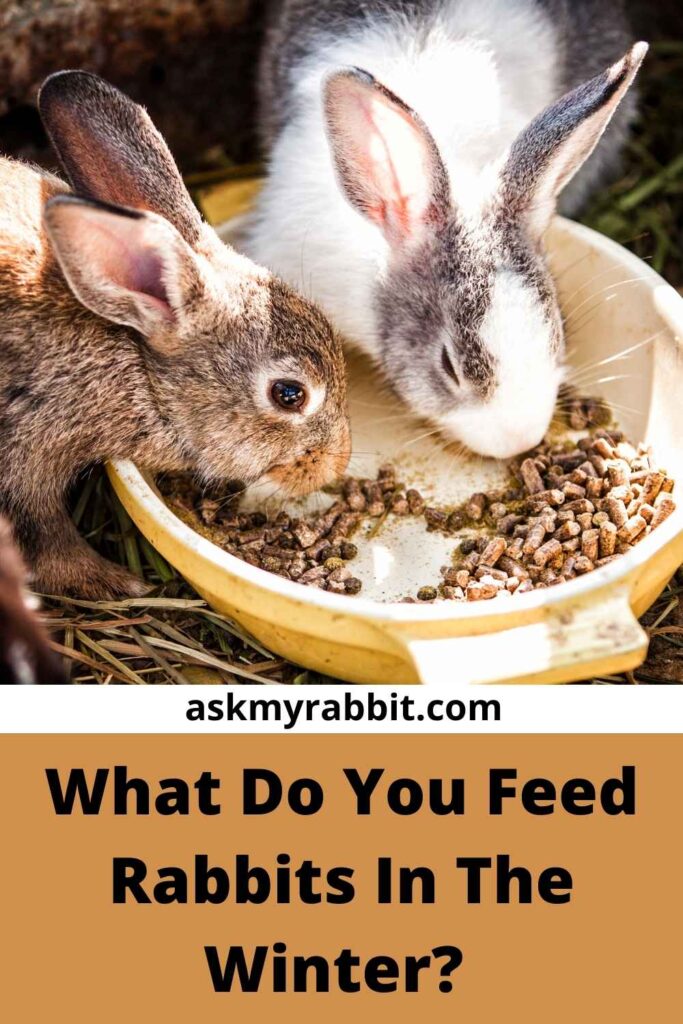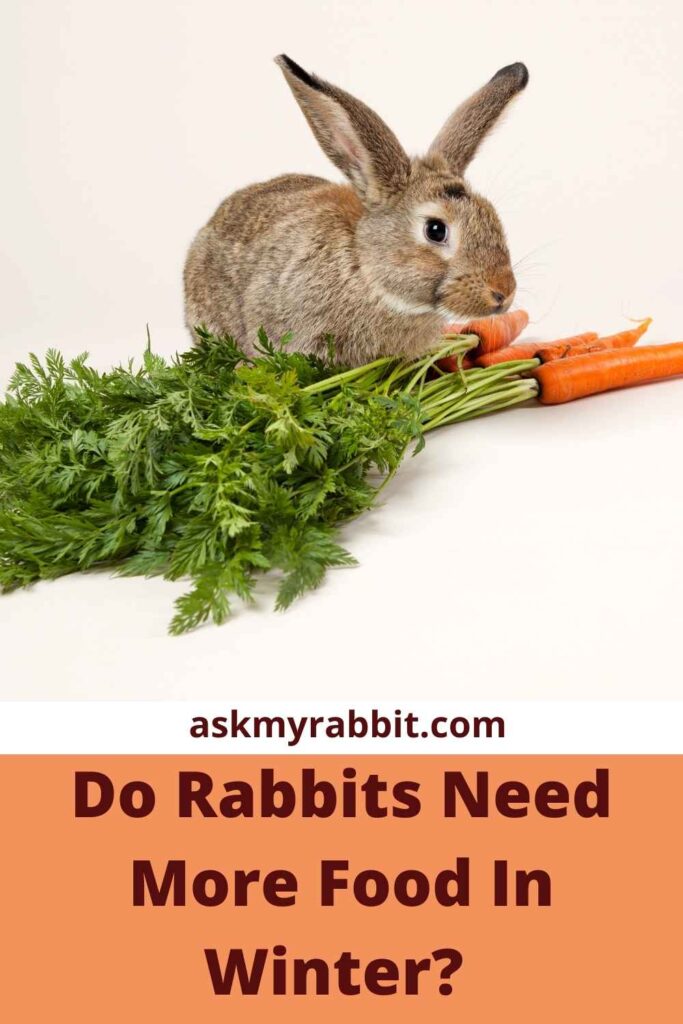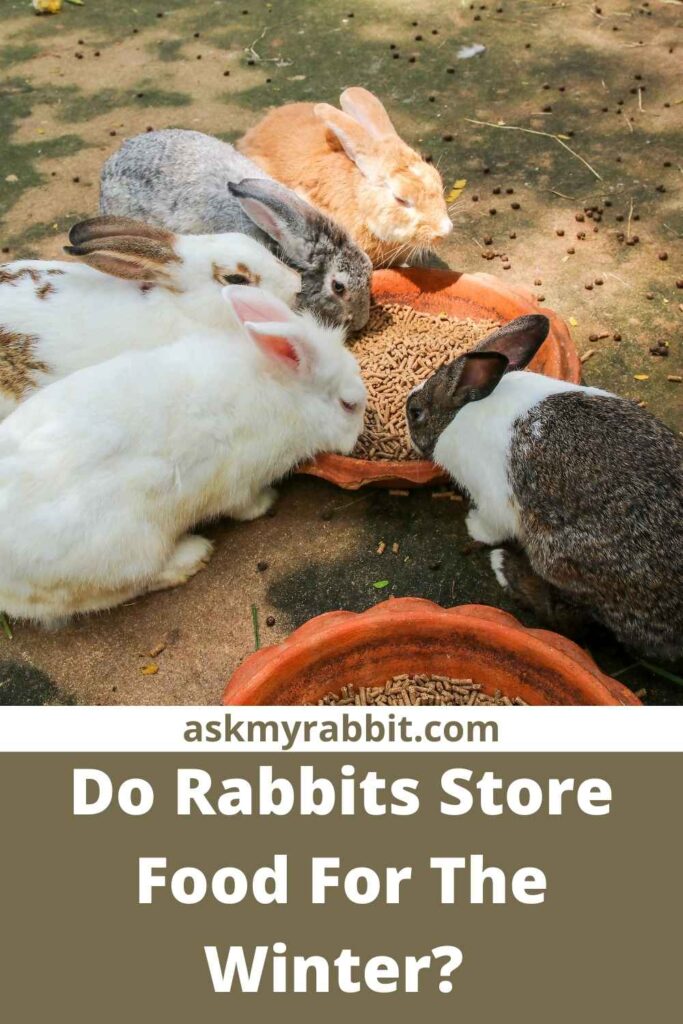Despite the apparent scarcity of the foods they regularly eat, rabbits in the wild are highly excellent at obtaining food. When their favoured grasses and hay aren’t readily available, they rely on two key nutritional sources.
They consume twigs, shrub buds, and lower-nutrient bark. Their cecotropes, or partially digested food, is the second item they ingest. This will provide their digestive system with another opportunity to extract even more energy from the food they’ve already consumed.
So, now that we know what rabbits in the wild eat during winter, you make think the same about your pet bunny.
Your pet rabbit’s diet will remain the same during winter as it was earlier in the year. However, the amount will fluctuate. Rabbits will naturally consume more Timothy Hay in order to grow weight and remain warm.
It’s critical to check that your rabbit’s water hasn’t frozen and gotten too cold for him to drink over the winter. Maintain the same quantity of good pellets, veggies, and fruits as in non-winter months. Sugar and carbs, which are usually found in most vegetables and fruits, must be reduced in your tiny bun’s diet.
In this article we will discuss all about your bunny’s eating habits during winter. So, keep reading!

What Do You Feed Rabbits In The Winter?
The digestive tracts of wild and pet rabbits are very comparable. They can nearly eat the same foods. This makes it simple to determine which foods are safe for rabbits to consume.
You may feed the following to your rabbits during winter:

1. Pellets
Rabbit pellets, which can be found online and at most pet stores, are particularly made to be calorie dense and include the majority of the nutrients that rabbits require. They are safe to consume for both pet and wild rabbits. A wild rabbit may make it through the winter with just a tiny amount of rabbit pellets.
Bunny pellets are also beneficial to rabbit moms who are breastfeeding their young. It can help her make enough milk for her kits. However, pellets should not be offered directly to bunny babies since new-born rabbit babies can only eat their mother’s milk until they reach a particular age.
2. Hay / Grasses
Most wild rabbits are wary of receiving food from people, although grasses or hay are the most closely related food to what wild rabbits consume in the wild. Most rabbits will not hesitate to take some hay because it is something they are used to.
If you already have pet rabbits at home, you should be familiar with the situation. Hay makes up the majority of your bunny’s diet. It includes the necessary dietary fibre to keep a rabbit’s intestines moving.
3. Vegetables
Vegetables are perhaps the most frequent domestic food that wild rabbits may eat. Fresh veggies are more readily accessible than rabbit pellets and hay in most areas. They also provide a rich source of critical nutrients, which can assist wild rabbits survive the winter months.
Here’s a list of popular vegetables that rabbits may eat safely:
- Arugula
- Carrot tops
- Cucumber leaves
- Endive
- Escarole
A combination of a few vegetables should be sufficient to keep a rabbit alive through the winter. However, make sure they are fresh. Canned vegetables may have too much salt, which is harmful to rabbits.
4. Fruits
Although rabbits do not consume much fruit in their native habitat, fruits can provide much-needed calories to help wild rabbits survive times of scarcity.
Fruits have a lot of sugar, which is bad for rabbits. However, they also include a lot of necessary vitamins and minerals, so a little goes a long way.
Here are some fruits that you can occasionally offer to rabbits as a treat:
- Apple
- Cherries
- Pear
- Peach
- Plum
- Kiwi
- Papaya
- Mango
How Much Do You Feed A Rabbit In The Winter?
Rabbits eat a lot of food when it’s during winter. They require around three hundred calories per day. Fresh grass makes up a significant portion of a bunny’s diet.
They consume less in the winter due to the paucity of food. Every day, the wild rabbit may be fed two or three cups of a diet mixture that included hay, pellets, vegetables, and fruits. That would be plenty for them to live.
Do Rabbits Need More Food In Winter?

Yes, rabbits need more food in winter. In order to maintain a constant body temperature, rabbits eat more food in the cold. Make sure to give your rabbit more food and hay so that they have the energy to remain warm.
Rabbits are well-adapted to coping with the cold. However, they need to consume more to satisfy the increased energy demands of staying warm.
As a result, the amount of feed supplied during the winter months will have to be increased. The extra meal is to compensate for the increased calories expended in maintaining body temperature.
A small amount of long-stem grass hay will assist keep the rabbit warm by increasing the heat of fermentation in the cecum. Make sure your rabbits have a way to get out of the cold and are safe from rain and snow.
Warmth can also be provided by additional bedding. Your rabbits will thrive in the winter months if they are adequately protected, fed, and have access to fresh water.
Do Rabbits Store Food For The Winter?

Yes, rabbits do store food for the winter. The colder temperatures and lack of foliage in the winter drive wild rabbits to spend more time looking for food. They frequently take refuge in subterranean tunnels that have been insulated with grass, straw, and twigs.
Domesticated rabbits living in outdoor hutches need caring human partners who remember to offer additional protection. It’s preferable to bring tame rabbits indoors during really cold weather.
Rabbits store food in winter as the approach and persistence of winter has devastated the formerly ample food source enjoyed by wild rabbits. Clover, fragile young plants, berries and vegetables are all gone or hard to come.
Wild rabbits consume the twigs, bark, and buds of trees and shrubs, as well as other woody plant components. The rabbit’s year-round habit of consuming their own pelleted excrement becomes much more crucial in the winter months. Rabbits use this to supplement their diets since their digestive systems aren’t very efficient.
It may appear strange that your rabbit reserves food for later consumption. After all, you feed them on a daily basis.
One possible cause is that you have not maintained a consistent routine. Bunnies enjoy knowing that they will be fed at a specific time each day. They’ll notice if you depart from this.
As a consequence, a rabbit will ensure that they have enough food when they are ready to eat. This habit should be eliminated if you stick to a rigorous regimen. They’ll soon be able to believe that their needs are being heard and met.
You could have also changed the hay brand in your bunny’s hutch. If your rabbit’s hay changes again, they may be accumulating their favourite flavours.
Your rabbit shouldn’t be worried of becoming hungry if you feed enough hay on a daily basis. However, keep an eye on their actions. Also, make sure they’re eating the hay they’ve been hoarding. It can be fatal if hay becomes moldy.
Frequently Asked Questions
What Do Rabbits Eat In The Winter?
Rabbits consume more wood-based food sources throughout the winter. These include tree bark, twigs and conifer needles.
Can Rabbits Survive Outside In Winter?
Yes, rabbits are capable of surviving outside in winter. Rabbits have adapted to the cold by wearing thick fur coats and having fur pads on their feet.
Do Rabbits Prefer Warm Or Cold?
Rabbits prefer temperatures between sixty and sixty five degrees Fahrenheit. They may even survive at lower temperatures if they are properly kept.
Final Words
Now that you know your bunny’s feeding habits, provide them with the utmost care. During the cooler months, your young bun will develop a thicker fur coat. However, you will still need to provide him with a warm home.
Appropriate housing and feeding during the winter months will help guarantee that your rabbit is protected from any outside predatory animals.
Go ahead and take care of those lovely bunnies now that you know everything there is to know about what to feed wild and pet rabbits in the winter. If you have any more doubts regarding the feeding habits of your bunny, drop them in the comment section below.







